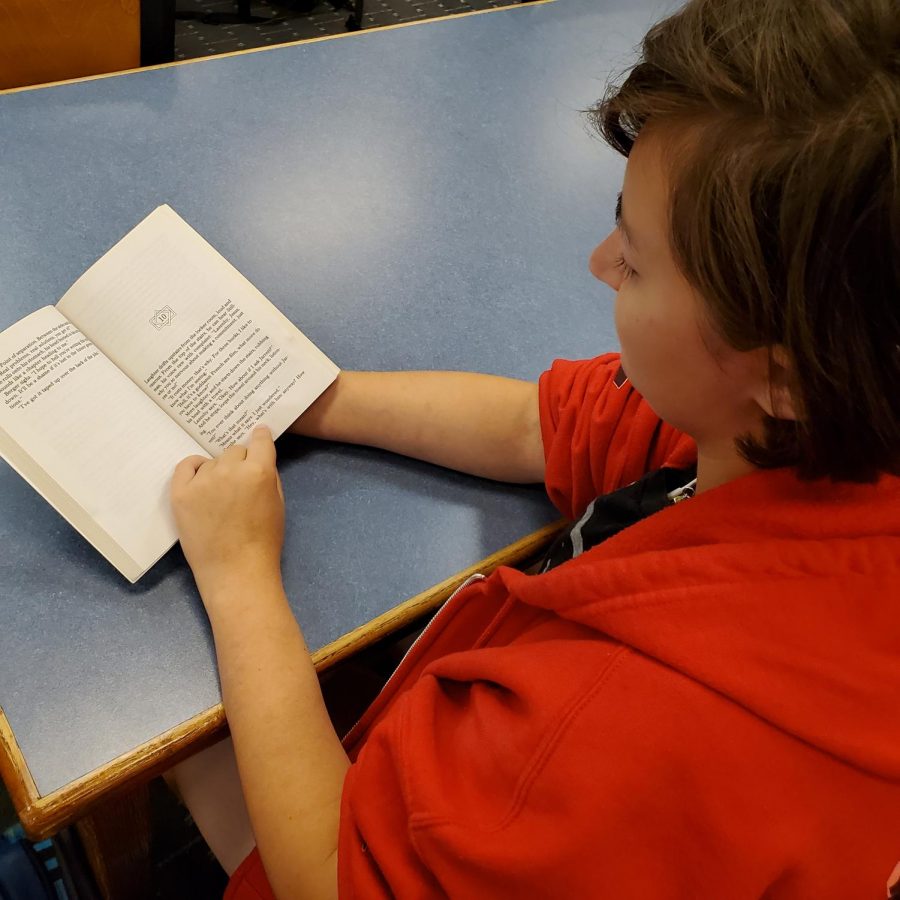Summer reading booked only for AP and Honors English
Photo by Photo by Sasha Kek
An English Honors students reads the summer reading book required for the course before class. CP students will no longer be needing to catch up on any reading over the summer months.
As of this year, summer reading will no longer be required for CP English students because “[English teachers] felt it wasn’t necessary to get through the goals and objectives for the course,” Karen Marchand, English lll Honors and AP Literature teacher, said.
“One of the goals of the English department is to foster a love of reading and we felt that forcing students to read a book just for the sake of reading that book when we were using it in the curriculum maybe wasn’t the best route,” Marchand said.
One reason the summer requirements were changed for CP classes was that the amount of time teachers would use to go over the material would differ and “there [weren’t] necessarily any specific requirements” for the summer reading according to Kim Philipp, English I Honors and English II CP teacher.
“We weren’t spending so much time devoted to this summer reading and there was no set curriculum with it specifically, so we felt it wasn’t necessarily necessary to have it,” Philipp said. “It was just one of those things where we felt it wasn’t going to affect the expectations of students or the class as a whole, that if we took it out, it wasn’t going to be detrimental.”
A new advantage CP English students have from the change is “the flexibility to read whatever they choose to [and] take their time reading,” Marchand says.
“We still highly encourage students to read over the summer, but we wanted to give them more flexibility of choice to meet interests, to make it more of a fun summer reading, and to foster a love of reading, versus having them read for curricular requirements,” Marchand said.
Unlike CP students, AP and Honors English students will still be assigned specific books to read over the summer “because of the extensive curriculum that [AP and Honors classes] have to get through during the school year,” according to Marchand.
“[AP and Honors English students] have always been required to have a summer reading book, so it hasn’t changed anything for them in any direction,” Marchand said. “It is a little more relaxed throughout the school year [for teachers] because we don’t have to assign as much homework because they’ve gotten a little bit of the content done before we started.”
Along with having an extensive curriculum, an AP and Honors English student’s expectation “should be that there’s more curriculum to cover and there should be higher expectations,” Marchand says.
“The expectation is that if someone is in an AP [or Honors] Literature class, they are supposed to already like to read,” Marchand said. “I think it’s fair for the CP students not to have a required book because it’s a choice to take an elective Honors or AP English.”
The decision to keep summer reading for AP and Honors classes is also due to the extensive time spent on the material, according to Philipp. The reading is also kept so Honors and AP students understand their expectations.
“Knowing there’s going to be extra work outside of class, understanding the deeper look into things, and really taking the initiative to keep up the work… not saying that CP students don’t have the same expectations, but I think there’s just a lot more responsibility placed on Honors and AP students,” Philipp said.
As a CP English teacher, Philipp is “excited to start the year with [the students], to really bring something to the table, [and to] start mentoring them and see where they’re at.”
“What I’ve seen in the past with some reading, unfortunately, is a lot of students don’t complete [the summer reading], so we don’t always get probably what their best work would be,” Philipp said. “I’m anticipating a positive start to the year by starting something as a whole and laying the foundation of expectations right away. I’ll get to see where my students are as readers early on.”

This is Sasha’s third and final year working with the Bear Facts staff as the LZ Life Editor. Aside from helping Bear Facts run smoothly, you can find...

